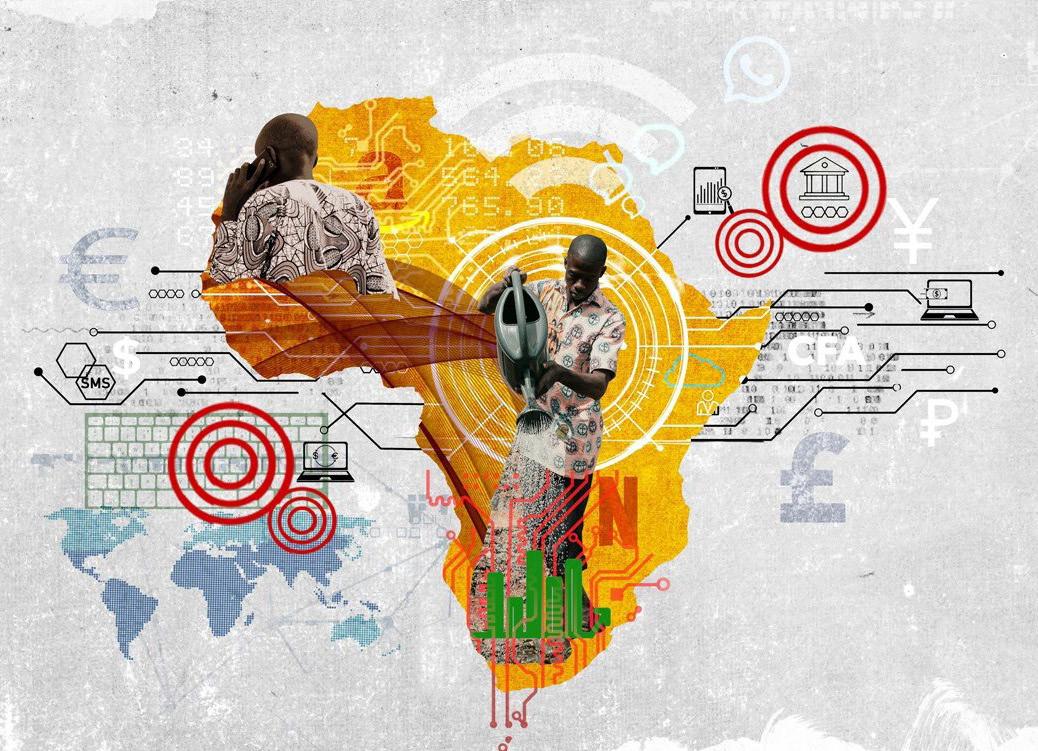
8 minute read
Leveraging international finance centres (IFCs) to support investment flows in Africa
DESPITE the ongoing global economic and political uncertainties, Africa’s outlook remains promising, particularly in the financial services sector. The region attracted $83 billion in foreign direct investments (FDI) in 2021. According to UNCTAD’s World Investment Report 2022, 45 percent of this investment was channelled to the financial services with $5.2 billion going to the start up sector (Fintech). The private equity industry recorded a total of 429 private equity deals worth $7.4 billion, according to data from Venture Capital Association (AVCA) data tracker.
Most of these deals require a combination of advance finance, legal capacity to facilitate efficient execution of the deals and flow of capital and are likely to be structured outside the continent, due to the complexity and lack of capacity in the region’s international financial centres.
Advertisement
Whilst the region continues to attract investments, it still requires capital to address long-term recovery. The financing deficit will require a combination of efforts, bringing together capital from the international capital markets, international financial centres and development financial institutions. Governments alone, given the competing financing priorities, cannot fill Africa’s financing needs.
The role of international financial centres in mobilising critical capital to Africa is therefore of great importance. They provide a secure jurisdiction, fund structuring and tax neutrality for investors.
Various countries have established international financial centres to attract investments into the continent, some of the notable IFCs in the region include Johannesburg and Capetown in South Africa, Mauritius, Cassablanca, Nairobi, Nigeria and Kigali.
Analysts predict an exciting new phase developing out of Africa’s financial services eco-system, given the under penetration of financial services compared to other regions. This challenge provides an opportunity to invest and collaborate to promote Africa’s financial services infrastructure.
International financial centres are a crucial and key component of the global economy and have proved to be key drivers in developing international trade and finance. The ever-increasing number in IFCs is testament to the success of IFCs globally. We have seen the recent launch of the Rwandan Kigali International Financial Centre (KIFC) and other African states looking to launch their IFCs in the future.
IFCs have both geographic and sectoral appeal, for instance, the British Virgin Islands (BVI) has often been the IFC of choice for Asia and particularly PRC-based investors and shareholders and is the home of hundreds of thousands of holding and operating entities. Labuan is the IFC of choice for Malaysia. The Marshall Islands is one of the most popular jurisdictions for ship registration. Bermuda is one of the world’s leading (re)insurance IFCs. Cayman Islands for investment funds (both closed and open-ended funds) and Jersey for banking, trusts and foundations.
On a macro level, the positive impact of IFCs was evidenced by a 2019 study undertaken by the Overseas Development Institute (ODI), a global affairs think-tank. The ODI study established that one of the major hindrances to economic growth in developing states was the lack of available financing and concluded that IFCs play a crucial role in mobilising finance. The study estimated that for the period 2007 to 2014 IFCs facilitated financing to developing states of $1.6 trillion, boosting
GDP in those countries by $400 billion and tax revenues by $100 billion during this period. Those tax revenues were largely invested in infrastructure and financial services, thereby ploughing back direct financial benefits to those jurisdictions.
Why IFCs? On a micro-economic basis, these jurisdictions have developed business-friendly environment of laws, professional service providers and creditorfriendly approaches. For example, if a grouping of international investors from different countries are looking to invest in an African project, such as a Zambian copper mine, they may incorporate a Zambian operating entity wholly owned by a Mauritius entity. Mauritius as such offers asset protection treaties, double taxation agreements (DTAs) or tax information exchange agreements (TIEAs) and other benefits in structuring.
In addition to the investor’s direct equity investment, they may seek to maximise their investment and possible returns by leveraging their investment by obtaining financing. The lenders in this scenario may insist that a BVI company is the 100 percent parent of the Mauritius entity. This is because the lenders will take security/collateral over the assets in the structure. Taking security at a BVI level, which operates a private and public security registration regime where first publicly registered security interests guarantee priority of interest (subject to very limited exceptions) and other creditor-friendly business environment factors, provides greater financial certainty and comfort to the lenders. In addition, the group of international investors may come from various jurisdictions and seek a vehicle from an independent jurisdiction that adopts an investor-friendly approach, such as ease of mergers or take-overs or re-domiciling the BVI entity.

Whilst IFCs do, to an extent, compete against each other in seeking to attract investors and international businesses, they also work together in providing optimum investment structures. This is illustrated in the BVI – Mauritius – Zambia structure highlighted above. IFCs have been instrumental in creating value and wealth in the jurisdictions that they serve and should be regarded as creating a mesh to facilitate international trade and investment. The aim is to improve the economies, GDP and general standard of living across the board.
The Global Financial Centres Index ranks IFCs based on a set of factors that boost the success of IFCs. These factors are critical study points for African IFCs. The factors considered in the study are the business environment, human capital, infrastructure, finance sector development, and reputation. These are the critical success factors of an IFC.

In the World Bank report on Business Environment 2020, the following subSaharan Africa IFCs are ranked top five: Mauritius (ranked 13); Rwanda (ranked 38), Kenya (ranked 56), South Africa (ranked 84), and Zambia (ranked 85). Morocco is ranked number 3 in the Middle East and North Africa region and number 53 in the world ranking. These ranking rates several important factors including starting a business, getting electricity, registering property, getting credit, paying taxes, and employing workers.
Casablanca’s business-friendly environment has several factors related to the city’s financial assets. Casablanca is currently home to the largest stock exchange in the North Africa region and boasts a population of more than 3.7 million.
The success of African IFCs is related to the business environment, the policymakers have to work to ensure that it is made easier for a business within limited timelines and with few licences.
The cost of essential power is also critical. Governments should work to ensure cheaper and more affordable electricity to drive economic activity. Access to qualified and skilled labour is essential for the success of IFCs. African countries must invest in quality education that will be an essential part of the success of IFCs. African IFCs may also require globally specialised professionals to assist with putting together policy and infrastructure for those IFCs to thrive.
Infrastructure development is a key driver for progress across the African continent and a critical enabler for productivity and sustainable economic growth. It contributes significantly to human development and poverty reduction. Investment in infrastructure accounts for over half of the recent improvement in economic growth in Africa and has the potential to achieve even more.
The African continent needs adequate infrastructure, secure energy, efficient transport, and reliable communication systems. These are critical success factors for African IFCs. The African countries have to prioritize this for the success of their own countries as well as that of their respective IFCs.
Among the most important consideration for investors in any jurisdiction, more-so in Africa, is the tax regime (including local tax rates, the availability of tax incentives and the supportiveness and effectiveness of the institutions). Building capacity for development and enforcement of attractive tax regimes, whilst keeping a country on the positive side of the regulatory international standard is integral. If the institutions are not strong, the regulatory structures will not be strong. Strong capital markets and clarity of regulation is also important for IFCs to thrive. For instance, Kenya’s Capital Markets Authority (CMA) and the Nairobi Securities exchange has grown exponentially over the years.
Other institutions that are important to IFCs are service providers such as fund managers, administration firms, accounting and audit firms and legal services providers.
An efficient and impartial enforcement of contracts is a major consideration for investors, the establishment of dispute resolution centres including commercial courts and Arbitration centers in the IFCs is a positive step.
Environmental and Social Governance (ESG) has become a major topic of consideration for investors in recent years, and ESG is a major risk to consider, at the same level to previously commonly known investment risks like political risk, contract risk, regulatory risk, financial/ credit risk, amongst others. Most if not all of the African countries have various laws that tackle ESG in its various components. For instance, countries have environmental and climate change laws that require environmental and social impact assessments, labour laws that are employee friendly that are based on the International Labour Organisation (ILO) conventions, anti-money laundering (AML) laws, and corporate and governance laws, including among others, the requirement for beneficial ownership reporting.
A challenge in start-ups is the awareness and capacity to have in place ESG measures that are relevant at the companies stage, from a climate impact, sustainability and investor- attractiveness perspective. Most of the existing ESG guidelines are extensive and may not be tailor-made or relevant for small startup companies. IFCs can contribute to this awareness and capacity by having guidelines and trainings on the relevant laws and international best practices (such as IFC Performance Standards), and how to easily apply them. A one- stop shop of ESG guidance by IFCs would be most useful.
While IFCs in Africa are in the nascent stages, establishing strategic relationships with the advanced IFCs will be greatly advantageous for both international and local investors. There does not have to be unhealthy competition. For instance, investment funds or investors registered in the BVI are always looking to invest in Africa, and would explore having feeder funds in African IFCs. A partnership between BVI IFCs and African IFCs would be beneficial for capacity building and cross- alignment of best practices between the centres.
Collaboration through efficient financial and legal systems will allow these centres to attract more investment. In most instances, the reason people engage with IFCs is to gain access to capital financial and legal systems set up around the centres should be enticing to investors as this provides comfortability and confidence.
Global professionals with relevant skills in establishing and managing successful IFCs can be an area of collaboration with the African continent. The professionals can provide the requisite skills to facilitate the growth of African IFCs.
Popular views expressed on IFCs fail to recognise the value they bring to the global economy, and as Africa struggles to access innovative financing for development, leveraging on IFCs will be an added advantage.
The establishment of the IFCs in the continent demonstrate that the region is ready to provide investment avenues for interested parties, given that most Funds are domiciled in jurisdictions out of the continent, there is a greater opportunity for IFCs to work with stakeholders in public and private sector to develop structured channels to mobilise funds to the continent.
There are many of policies that need to be developed for the IFCs to be properly established. The partnership with international IFCs will assist African IFCs to develop relevant policies.
Financial products in the African continent are still developing and not as advanced as those in Europe and America. The partnership with the established IFCs will enhance accelerated product development within the African continent.
Technology transfer, the African IFCs can benefit from the advanced technology from the well- established IFCs. The technology will help propel the growth of the IFCs.
The IFCs will benefit from the youthful and vibrant workforce from the African continent. The youth have very innovative ideas that the IFCs can benefit from.











